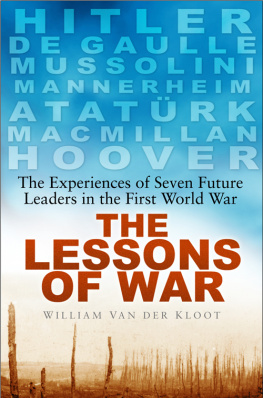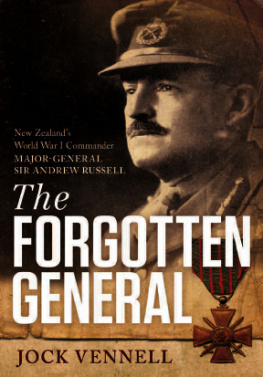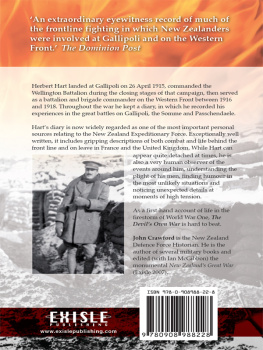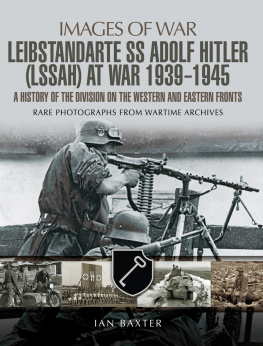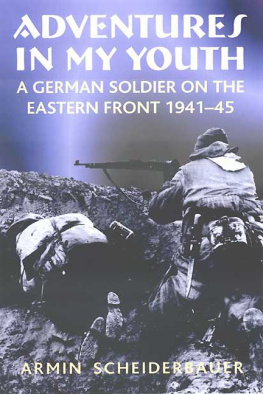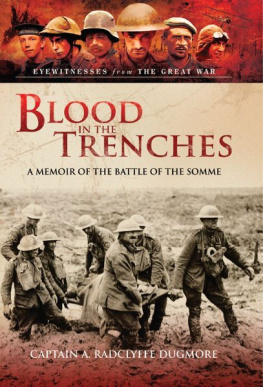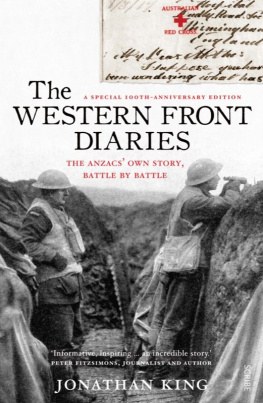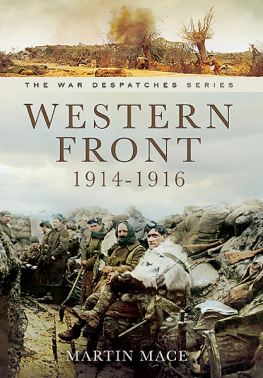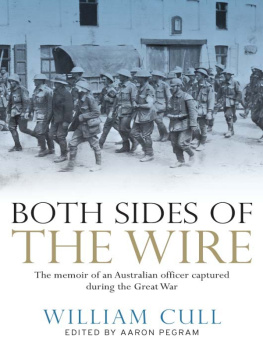THE
LESSONS
OF WAR
THE
LESSONS
OF WAR
The Experiences of
Seven Future Leaders
in the First World War
W ILLIAM V AN DER K LOOT

Quotation from Trench Duty by Siegfried Sassoon on pp 107108 copyright Siegfried Sassoon by kind permission of the Estate of George Sassoon (U.K.); Collected Poems of Siegfried Sassoon by Siegfried Sassoon, copyright 1918, 1920 by E.P. Dutton. Copyright 1936, 1946, 1947, 1948 by Siegfried Sassoon. Used by permission of Viking Penguin, a division of Penguin Group (USA) Inc. (U.S.A.)
Quotation from Over the Brazier by Robert Graves on p. 210 by kind permission of Carcanet Press Limited
First published in 2008
The History Press
The Mill, Brimscombe Port
Stroud, Gloucestershire, GL5 2QG
www.thehistorypress.co.uk
This ebook edition first published in 2013
All rights reserved
William Van der Kloot, 2008, 2013
The right of William Van der Kloot to be identified as the Author of this work has been asserted in accordance with the Copyright, Designs and Patents Act 1988.
This ebook is copyright material and must not be copied, reproduced, transferred, distributed, leased, licensed or publicly performed or used in any way except as specifically permitted in writing by the publishers, as allowed under the terms and conditions under which it was purchased or as strictly permitted by applicable copyright law. Any unauthorised distribution or use of this text may be a direct infringement of the authors and publishers rights, and those responsible may be liable in law accordingly.
EPUB ISBN 978 0 7509 5146 3
Original typesetting by The History Press
Contents
I
Sarajevo to the opening battles
Adolf Hitler
28 June 1914
Toward the end of the afternoon, Hitler was painting a watercolour in his room on the third floor of his lodging house in Munich, at Schleissheimer Strasse 34. A twenty-five-year-old who specialized in views of notable buildings, his sales brought him enough to live modestly, with time free for arguing politics in coffee houses and for reading books from the State Library. His landlady, Frau Popp, recalled that a hubbub in the street brought her lodger downstairs, where she told him that the Austrian Archduke and his wife had been murdered in Sarajevo. Hitlers own recollection was that Peppi Popp, the thirteen-year-old son of the family, brought the news to his room, but the boy knew no detailsjust the headline. Hitler was jubilanthe detested the Archduke, a German who had degraded himself by marrying a Czech and who wanted to share power among the nationalities of the Austro-Hungarian Empireit was divine justice.
Harold Macmillan
28 June 1914
Macmillan, a youth of twenty, elegant in white tie and tails, was attending a London ball. The stairs in the magnificent residence were decorated with carnations and spirited waltzes were provided by Mr Cassanis string band. At first he did not dance; the floor was too crowded for anyone so clumsy. He was tall, willowy and languida popular configuration at the time, with good features on an oval face; his upper eyelid was partially covered with a skin fold, suggesting Viking descent. As the evening went on, the older guests departed; the leeway on the floor overcame his shyness. Once started, he danced so vigorously that three times he changed into a spare clean collar. When he finally departed, he paid little attention to the headline shouted by a newsvendor: Austrian archduke and wife assassinated. It was a remote affair in a distant, perpetually troubled quarter of the globe. He returned to his parents house at 52 Cadogan Place. The next morning his mother Nellie grilled him about every detail of his evening; as usual they spoke in French. We do not know whether the murders were mentioned. Later that day he was back at Oxford in his rooms in Balliol College.
July 1914
The assassin was a Bosnian Serb, Gabreil Princip, one of a group of six young terroristsaged from sixteen to twentyprovided with weapons and assisted in slipping across the border by a secret Serbian organization, Union or Deathcommonly called the Black Hand. The Austro-Hungarians had occupied Bosnia-Herzegovina in 1878, to preserve order as the Ottoman grip loosened. At the same time Serbia became an independent country. The Serbians wanted Bosnia-Herzegovina but were too weak to seize it. Shortly after the royal couple arrived for their well-publicized visit to Sarajevo a terrorist bomb bounced off the boot of their car. Hours later, by sheer chance, Princip was able to kill: the procession made a wrong turn and stopped to shift into reverse immediately in front of him. He had not meant to hit the wife, but in training had fired only a few practice rounds. One of the youths talked, so the police rounded up all of their helpers in Bosnia and they told them the names of their contacts in Serbia. The terrorists were tried in October. The assassins were too young to be executed. Princip was given twenty years and died of tuberculosis coupled with starvation in 1918; some of the older supporters were executed.
The eighty-four-year-old Emperor Franz Joseph wanted the Serbs to learn a strict lesson: they must renounce terrorism as a weapon in international politics. The Austrian Foreign Minister, Leopold, Count Berchtold, met with the Council of Ministers to recommend war. Tisza, the Hungarian Prime Minister, did not want more quarrelsome Slavs in their empire, so he delayed a decision by insisting that for war they must have unequivocal support from their German allies. Therefore, Berchtold wrote to Kaiser Wilhelm IIan intelligent, experienced ruler who was also a fool (to prove my point, in his autobiography Wilhelm tells us that the war was plotted in 1909 in a secret covenant between the British, French and Americans, organized by the Freemasons). Wilhelm was handed the letter by the Austro-Hungarian ambassador. In years past the Kaiser had refused to back adventurism in the Balkans; but now it was different. The Archduke and the Kaiser were friends; only a few weeks before the Kaiser had vacationed at their Bohemian castle. He promised the ambassador that he would support whatever the Austro-Hungarians decided to do. Next the Kaiser met with the Imperial Chancellor, von Bethmann-Hollweg, who was surprised by the blank cheque given to their ally, but did not have the spine to invalidate it, even though under the constitutionwritten by Bismarck for Bismarckit was his responsibility. He knew that if Austria-Hungary attacked Serbia it was likely to trigger an avalanchethanks to the network of treaties negotiated to preserve a balance of power. If the Russians came to the aid of their Slavic clients then Germany was pledged to fight alongside the Austro-Hungarians. That would bring in the French. As the Kaiser pointed out when he had restrained a somewhat similar adventure proposed by the Austro-Hungarians two years before, Paris will undoubtedly be supported by London. Thus Germany will have to embark on a life-and-death struggle with three great powers. We hazard all, and may lose all. It was a reasonable, statesmanlike analysis, which held with equal force in 1914. After the meeting, the Kaiser coolly resumed his summer vacation, yachting up to Norway.
Elated by the blank cheque, Berchtold proposed to invade immediately, but Tisza still held back. They agreed to issue an ultimatum, which Berchtold planned to make unthinkable for the Serbs to accept. They also agreed that if it came to war, they would let it be known that they would take no Serb territory. As they prepared the ultimatum in secret, Serbia faded from the headlines and from the public mind. The July weather was glorious throughout Europe and most people enjoyed it thoroughly.
Next page
